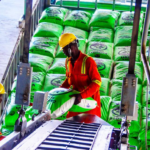Nigeria’s shea nut market presents a paradox. It has, for years, lagged behind other countries in converting its nuts into higher-value shea butter.
Although the country produces nearly 40% of the world’s supply, it captures only a paltry fraction of the $2.56 billion global shea-butter market, thanks to factors such as limited local processing capacity and informal cross-border trade.
Of the 500,000 metric tonnes of raw shea nuts produced each year, Nigeria loses an estimated 90,000 to cross-border smuggling, thereby losing potential profits to other countries.
To curb this imbalance, the Federal government announced a moratorium on the export of raw shea nuts in late August. The ban, which spans six months, is required “to secure supply for local processors, create jobs and protect a value chain where 95% of pickers are women,” says President Tinubu.
Shea nuts on the rise
The timing couldn’t be more right. A recent report by Mordor Intelligence, an international research outfit, projects the shea-butter market value to hit $3.75 billion by 2030. This expansion draws on the growing preference towards natural skincare products and sustainable ingredients in food.
Extracted from shea nuts, shea butter contains a rich concentration of fatty acids and vitamins, which makes it suitable for a variety of purposes. It’s found vast usage in the cosmetic industry, where it’s a staple in everything from body moisturisers to shampoos.
Its antioxidant and anti-inflammatory properties also make shea butter a notable ingredient of anti-ageing formulations. With consumers willing to pay a premium for naturally sourced ingredients, shea butter has become a notable constituent of a growing class of skincare products.
Recently, hiccups in the West-African cocoa supply chain have also ramped up usage of the ivory-coloured butter among chocolate makers. Many confectionery producers, looking to expand their portfolio beyond cocoa butter, have turned to shea butter as a sustainable alternative.
Because of its high composition of stearic acid, shea butter can withstand high heat and provides a mouthfeel quality akin to cocoa butter.
Along with these applications, recent regulatory approvals have added to the mix, creating a booming global shea economy. In 2024, Europe captured more than 34% of the share of the shea-butter market, with the Asia-Pacific region rapidly moving up the ranks.
Across West Africa, shea trees are found naturally in the wild along a vast strip known as the shea belt. Traditionally, women have harvested the fallen fruits as an essential source of income, collecting the fallen nuts from trees in communal forests and parklands. As such, shea nuts are sometimes called “women’s gold.”
In Nigeria, where the trees are found in 21 states, only four—Niger, Kebbi, Oyo and Kwara—produce quality shea that meets export standards.
Experts have since decried the federal government’s six-month ban on raw shea, which they describe as hasty and ill-conceived.
In the wake of the ban, the price of shea nuts has since fallen by a third to N800,000 a tonne, according to Vestance, a consultancy that monitors the prices of agricultural products.
Part of the issue with the ban is also its time frame. It’s hardly likely that the Federal government will revamp the local shea-nut industry in half a year.
Importing the required machinery into the country will take up around 60 days, leaving the government with just 120 days for installing the equipment, training the farmers and courting investors.
What’s more, the ban is likely to ramp up smuggling. Many farmers who took loans from the banks to invest in the shea-nut industry are already facing losses from this export ban. Many may take to smuggling to meet up with their loans, thereby defeating the essence of the ban.
Nigeria joins a league of west-African countries, including Burkina Faso, Ghana, Mali, Ivory Coast and Togo, that have restricted the export of shea nuts in the past two years in favour of domestic processing. But it remains to be seen how the export ban has translated into economic gains for these countries.
Alongside smuggling, the local shea industry contends with deforestation. Typically, a shea tree takes around 30 years to start producing nuts. For years, shea trees have been axed for timber and charcoal, threatening the sustainability of the species.
While the ban may lead to a supply glut in the domestic market, further crashing the price, it poses harm to many on the supply chain. In response, experts argue instead that the government should focus on practical measures such as introducing basic technology to boost processing and rolling out interventions for farmers productivity.
Thanks to increasing public awareness, global knowledge about the merits of shea butter has surged, elevating its status from a mere cosmetic component to a sought-after food ingredient.
Many experts say that an outright ban is not an ideal means to tap into this growing demand.
Summary not available at this time.






